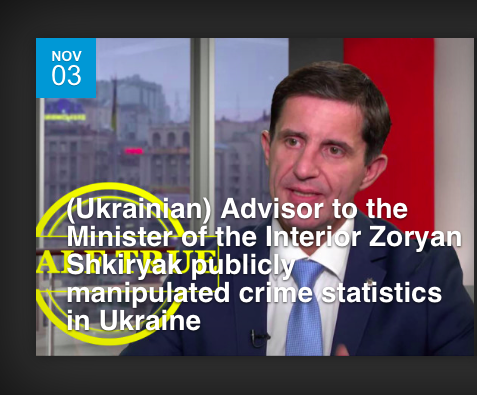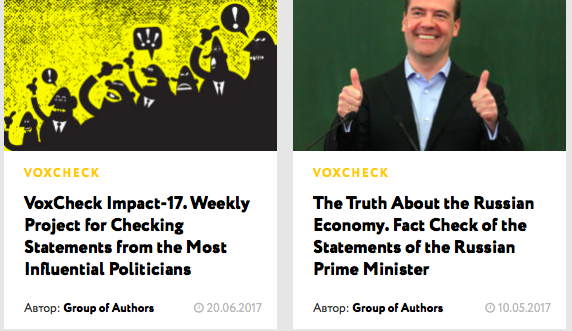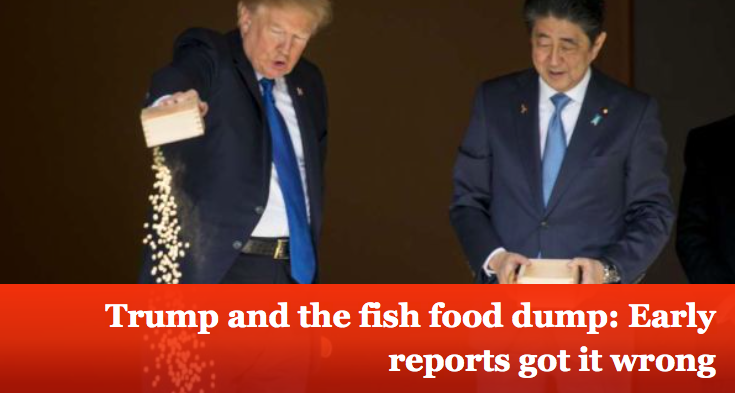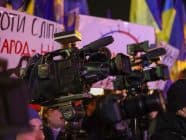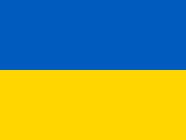Fact-checking organisations approach their work differently, depending upon their location. A recent comparison between American and Ukrainian fact-checking projects has highlighted key differences. The American sites focus on a very broad range of political stakeholders, (politicians, governments, media, talk show hosts, opinion leaders, experts and mayors), whilst Ukrainian projects examine only senior politicians, as well as general political and economic news.
However, despite variations in scope and content, the sites in Ukraine and US adhere to similar basic principles and routines.
These are the conclusions of my recent research into fact-checking in the US, Ukraine and Czech Republic. The study, Fact-Checking as a Phenomenon of Contemporary Professional Journalism was based on a content analysis of two Ukrainian and two US fact-checking organisations: VoxCheck and FactCheck.com.ua in Ukraine; PolitiFact, and FactCheck.org in the US. I also conducted three in-depth interviews: with Igor Korkhovyi, head of FactCheck.com.ua; Zdeněk Jirsa, project manager of Czech site, Demagog.cz; and Aaron Sharockman, executive director of American PolitiFact.
Who is checked?
PolitiFact, an American fact-checking site, is one of the best known internationally. It checks hundreds of sources, including the public statements of organisations, pressure groups, parties, charitable organisations, etc. The site works alongside PunditFact, which verifies the statements of bloggers, political analysts, experts and other individuals in the media. Politifact’s main aim, according to Sharockman, is “to keep politicians accountable.”
By contrast most Ukrainian sites have a narrower remit, drawing on between 20 and 30 sources. They usually check policy-makers – the president, prime minister, members of parliament and other key political figures.
Ukrainian projects, VoxCheck, (founded in 2015), and FactCheck.com.ua, (2016) focus on political and economic issues. From January to April 2017, the topics most checked by those two projects were “politics”, “economy” and “blockade of Donbass”. Less attention was paid to “land market”, “railroad”, “medicine” and “Roman Nasirov” (the former head of Ukraine’s Fiscal Service).
As for politicians, the statements of President Petro Poroshenko, the former and current prime ministers – Arseniy Yatsenyuk and Volodymyr Groisman, former head of the National Bank, Valeriya Gontareva, and also Roman Nasirov, formerly of the State Fiscal Service, were checked.
Different resources and markets
The differences between the sites can be explained in a number of ways. The fact-checking sites studied in Ukraine are less well-established, have limited resources and smaller audiences. They were both founded by non-governmental organisations (NGOs) and depend on grants, volunteers and crowd-funding initiatives.
Both of the US sites were started by established media organisations or institutions, they have a much larger market and have received public recognition for their work. FactCheck.org, founded in 2003 by the Annenberg Public Policy Centre, has won numerous awards. PolitiFact, started in 2007 by the Tampa Bay Times, owned by the Poynter Institute, was awarded a Pulitzer Prize in 2009 for its coverage of the 2008 US elections.
Shared principles: which statements to check?
While topics and scope of fact checking vary between the US and Ukrainian sites, similarities were also found. For example, all journalists pay attention to statements that may be false or misleading. They often rely on instinct and professional experience when choosing what to check, but they also follow some basic principles.
Ukrainian fact-checking organisations have adopted criteria originally developed by the US projects. Ukraine’s FactCheck, for example, uses a system of verification developed by Politifact and acknowledges this on its website. PolitiFact was one of the first organisations to develop and make public its verification system.
In deciding which statements to check, Politifact applies these questions:
- Is the statement rooted in a fact that is verifiable? They don’t check opinions, and they recognize that in the world of speechmaking and political rhetoric, there is a license for hyperbole.
- Is the statement leaving a particular impression that may be misleading?
- Is the statement significant? The organisation avoids minor “gotchas” on claims that represent a slip of the tongue.
- Is the statement likely to be passed on and repeated by others?
- Would a typical person hear or read the statement and wonder: Is that true?
Aaron Sharockman, of Politifact, lists three general criteria for selecting statements for verification: “The key is the importance of communicating in society and the significance of the impact it has. If the information can be verified, it should be checked, even if it turns out to be true. A claim can be verified if it has a specific actual statement and has a reference to the statistics. It cannot be verified if the statement concerns the future or it is a personal opinion.”
How to be accurate?
The question of accuracy is especially important to fact-checking projects. Yet even experienced fact-checking organisations sometimes fail to reach this professional standard. For example, former US President, Bill Clinton, once stated that since 1961, Democratic presidents have created twice as many jobs as Republican presidents. Clinton’s statement was initially noted as true by fact-checkers. However later analysis of economic policies found the picture was far more nuanced: although Democratic presidents had generally created more jobs since 1961, some individual Republican presidents had a better record in job creation than some Democratic presidents. It was therefore concluded the Democratic party did not have a more successful economic policy, as Clinton had implied.
Interviewees for my study made a number of basic recommendations aimed at simplifying and standardising the fact-checking process.
The first was that editorial staff should attempt to get a comment from the person who made the original statement, before resorting to final verification. This shifts the burden of proof to the statement’s author.
Sources of objective information are also important as is establishing a reputation for independence and credibility. FactCheck.org, for instance, uses official government agencies, independently verified data and independent think tanks. PolitiFact advocates transparency about sources and processes and regularly publishes a detailed explanation of how it approaches fact-checking. In the Ukraine, VoxCheck emphasies its independence from political and business interests on its site.
Zdeněk Jirsa, head of Czech fact-checker Demagog.cz, believes that while fact-checkers aim at the ideals of neutrality, independence, and objectivity, absolute objectivity is rarely possible. Jirsa advocates that fact-checkers must at least aim to provide readers with the most accurate information possible, drawing on independently verified statistics for example. Demagog has also introduced a three-level check: this ensures that every quote verified by the site has to be checked by three independent experts.
You may also be interested in a recent study: The Rise of Europe’s Fact-Checking sites
This article originally appeared on EJO Ukraine
Sign up the the EJO’s regular newsletter: covering the latest European media research and news
Picture: VoxCheck, PolitiFact, FactCheck Ukraine, screenshots
Tags: Demagog.cz, fact-checking, Factcheck.org, independent journalism, Politicheck, Poynter Institute, Punditcheck, Tampa Bay Times, Ukraine, VoxCheck, VoxUkraine

